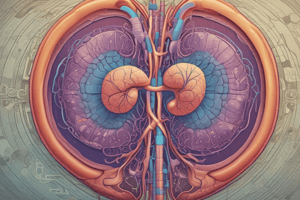Podcast
Questions and Answers
What is the main function of the renal system?
What is the main function of the renal system?
- To store nutrients for energy production
- To filter waste and excess fluids from the blood (correct)
- To produce hormones that help with digestion
- To regulate body temperature
Where are the kidneys located in the body?
Where are the kidneys located in the body?
- In the upper abdomen, one on each side of the spine (correct)
- In the pelvic region, one on each side of the hips
- In the chest cavity, one on each side of the heart
- In the lower abdomen, one on each side of the spine
What is the function of the glomerulus in the nephron?
What is the function of the glomerulus in the nephron?
- To filter waste and excess substances from the blood (correct)
- To reabsorb water and electrolytes
- To produce hormones that help produce red blood cells
- To regulate electrolyte levels and pH balance
What is the role of antidiuretic hormone (ADH) in urine formation?
What is the role of antidiuretic hormone (ADH) in urine formation?
What is the main function of the ureters?
What is the main function of the ureters?
What is autoregulation in the context of renal function?
What is autoregulation in the context of renal function?
What is the function of the proximal convoluted tubule in the nephron?
What is the function of the proximal convoluted tubule in the nephron?
What is the role of aldosterone in renal function?
What is the role of aldosterone in renal function?
Flashcards are hidden until you start studying
Study Notes
Overview of the Renal System
- Also known as the urinary system
- Responsible for filtering waste and excess fluids from the blood
- Regulates electrolyte levels, acid-base balance, and blood pressure
- Composed of two kidneys, two ureters, the bladder, and the urethra
Kidneys
- Located in the upper abdomen, one on each side of the spine
- Receive about 20% of the heart's blood output
- Function:
- Filter waste and excess substances from the blood
- Regulate electrolyte levels and pH balance
- Produce hormones that help produce red blood cells and maintain strong bones
- Help regulate blood pressure
Nephrons
- Functional units of the kidneys, approximately 1 million per kidney
- Composed of:
- Glomerulus (cluster of capillaries)
- Bowman's capsule (surrounds glomerulus)
- Proximal convoluted tubule (reabsorbs water and electrolytes)
- Loop of Henle (regulates electrolyte levels)
- Distal convoluted tubule (regulates water reabsorption)
- Collecting duct (transports urine to renal pelvis)
Urine Formation
- Glomerular filtration: blood pressure forces fluid through glomerulus into Bowman's capsule
- Tubular reabsorption: necessary substances reabsorbed into bloodstream
- Tubular secretion: waste products secreted into tubules
- Urine concentration: regulated by antidiuretic hormone (ADH) and aldosterone
Urinary Tract
- Ureters: muscular tubes that transport urine from kidneys to bladder
- Bladder: stores urine
- Urethra: tube that carries urine out of the body
Regulation of Renal Function
- Autoregulation: kidneys regulate their own blood flow and filtration rate
- Neural regulation: sympathetic nervous system regulates renal blood flow and glomerular filtration rate
- Hormonal regulation: hormones such as ADH and aldosterone regulate renal function
Overview of the Renal System
- Renal system is also known as the urinary system
- Responsible for filtering waste and excess fluids from the blood and regulating electrolyte levels, acid-base balance, and blood pressure
- Composed of two kidneys, two ureters, the bladder, and the urethra
Kidneys
- Located in the upper abdomen, one on each side of the spine
- Receive approximately 20% of the heart's blood output
- Functions include filtering waste and excess substances from the blood, regulating electrolyte levels and pH balance, producing hormones to produce red blood cells and maintain strong bones, and helping regulate blood pressure
Nephrons
- Functional units of the kidneys, approximately 1 million per kidney
- Composed of a glomerulus, Bowman's capsule, proximal convoluted tubule, loop of Henle, distal convoluted tubule, and collecting duct
- Glomerulus is a cluster of capillaries
- Bowman's capsule surrounds the glomerulus
- Proximal convoluted tubule reabsorbs water and electrolytes
- Loop of Henle regulates electrolyte levels
- Distal convoluted tubule regulates water reabsorption
- Collecting duct transports urine to the renal pelvis
Urine Formation
- Glomerular filtration occurs through blood pressure forcing fluid through the glomerulus into Bowman's capsule
- Tubular reabsorption involves necessary substances being reabsorbed into the bloodstream
- Tubular secretion involves waste products being secreted into tubules
- Urine concentration is regulated by antidiuretic hormone (ADH) and aldosterone
Urinary Tract
- Ureters are muscular tubes that transport urine from the kidneys to the bladder
- Bladder stores urine
- Urethra is the tube that carries urine out of the body
Regulation of Renal Function
- Autoregulation allows kidneys to regulate their own blood flow and filtration rate
- Neural regulation involves the sympathetic nervous system regulating renal blood flow and glomerular filtration rate
- Hormonal regulation involves hormones such as ADH and aldosterone regulating renal function
Studying That Suits You
Use AI to generate personalized quizzes and flashcards to suit your learning preferences.




